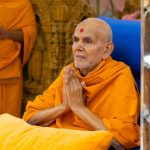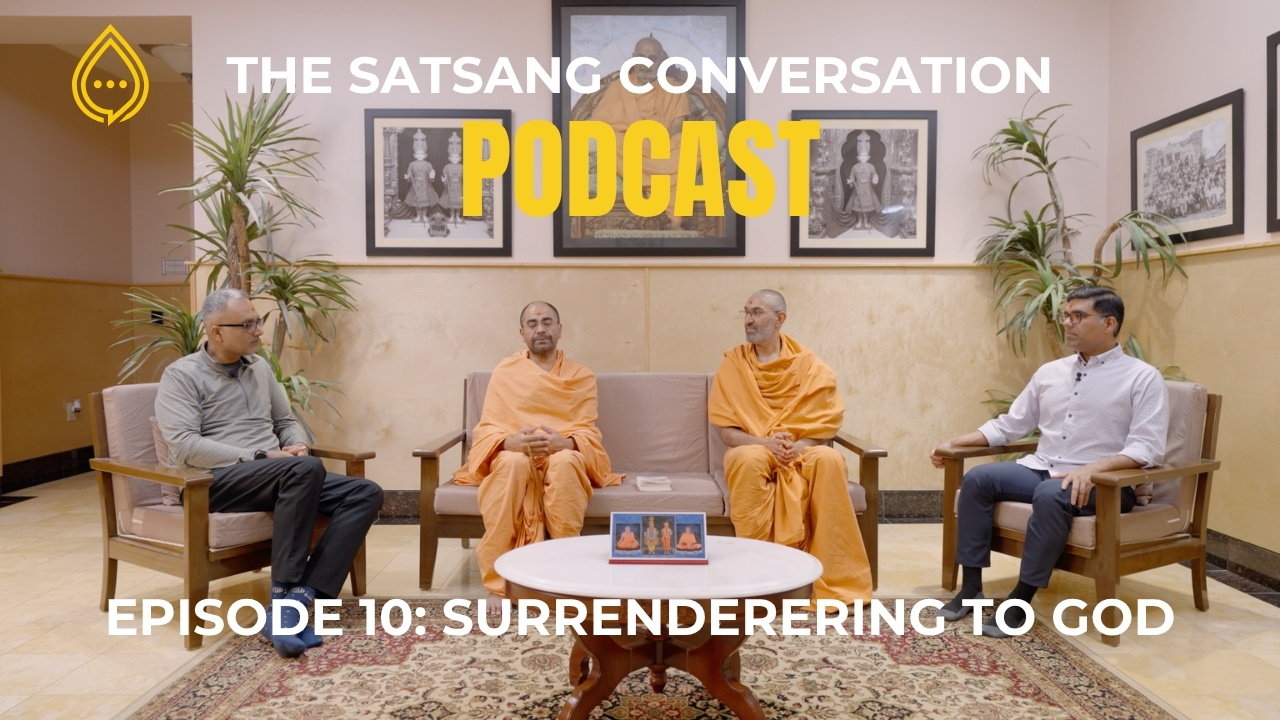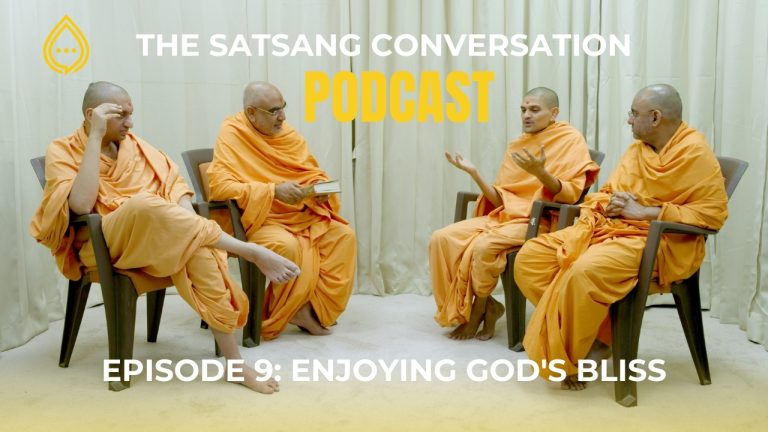What does true surrender look like in a world obsessed with performance and results? In this episode of Satsang Conversations, we travel to the BAPS Swaminarayan Mandir near Atlanta, Georgia to explore the life and legacy of Premanand Swami—a poet-saint whose music, humility, and complete sharaṇāgati (surrender) to Bhagwan Swaminarayan continue to guide seekers today.
A Life Tuned to Obedience
Abandoned as an infant and raised by a kind couple, the young Nijbodhanand (later known as Premanand Swami) first met Bhagwan Swaminarayan in Jetpur and again in Gadhada. Captivated by the divine aura of Maharaj, he stayed—and obeyed.
Maharaj instructed him to go to Ujjain to master Piṅgal Vidyā and classical music—and he left without delay. Years later, after returning as a consummate musician, he received diksha. In a striking turn, Maharaj asked him to put the sarangi aside, write nothing, and quietly study Sanskrit on the banks of the Ghela while keeping company with Nishkulanand Swami.
Eight months passed. No questions. No complaint. Only trust.
Then one day, Maharaj returned the sarangi and asked him to sing. Premanand Swami lifted the instrument and requested Maharaj to place His hands upon it—a gesture that made clear where his talent truly came from.
“There’s a sarangi and there’s a player of the sarangi.
I am only an instrument; the true singer is Bhagwan Swaminarayan.”
Music that Moves Heaven and Earth
At the Junagadh durbar, after court musicians performed, Maharaj glanced at Premanand Swami. Instantly, he sang “Āśā ko dīyārī ve,” leaving the Nawab speechless and in tears.
On another evening in Gadhada, visiting maestros from Gwalior doubted when Maharaj asked for Rāg Bhairav—a morning raga—at dusk. Unfazed, Premanand Swami began. As he sang, the atmosphere itself seemed to shift—the sabhā experienced the freshness of dawn. The point wasn’t spectacle; it was śaraṇāgati that made mastery effortless and egoless.
The Heart of His Bhajan: Sharanagati without Ego
Consider the beloved kirtan “Ho rasiya, me to sharaṇ tihārī”:
Ho rasiyā, me to sharaṇ tihārī…
Nahī sādhan bal vachan chāturī…
Ek bharoso charaṇe Girdhārī…
“I have no strength, no clever words—only one trust: Your feet.”
In those lines live the core virtues the santos highlighted:
- Sharaṇāgati: Complete refuge in God/Guru.
- Bhakti: Love as the motive force, not fear.
- Atyant namratā: Utter humility that refuses credit.
This is not resignation; it’s a radical clarity about karta–harta—God as the doer.
Sarva-kartā-panu—The All-Doer, for Our Betterment
In Swaminarayan philosophy, God (and the Ekāntik Sant) is the all-doer. But we never stop there. As Mahant Swami Maharaj has emphasized (and as codified in Satsang Diksha):
Whatever happens by God’s will happens for my good.
That second clause transforms surrender from weakness into courage. Pressure eases because results no longer sit on our shoulders—they rest with the One who loves us most.
The santos shared lived glimpses of this through Pramukh Swami Maharaj—from his tender personal care for devotees to a TV interview in Lusaka where he halted filming until Thakorji was properly visible. His message was simple and sweeping: God looks after us; we are nothing without Him.
When Life Stings: Perspective, Acceptance, and Growth
What about suffering? The discussion tackled the classic paradox: “Why do bad things happen to good people?”
Pramukh Swami Maharaj reframed it through perspective and trust—like a child receiving a painful injection that heals. Stories of Arthur Ashe and Nelson Mandela illustrated how acceptance can catalyze growth rather than bitterness.
A Gujarati reminder from the episode:
“Dukh āpīne pan sāru kare chhe, anē sukh āpīne pan sāru kare chhe.”
Even through pain, God does good; through joy, too, He does good.
From Sabha to Monday Morning: Making It Practical
- Before pressure moments—a presentation, hard conversation—pause for prārthana. Consciously offer results to God.
- Name the ego: “I am an instrument.” Then act with your full skill—but without anxiety over outcomes.
- Practice acceptance: Like Premanand Swami waiting eight months, choose trust over inner argument.
- Return to love: Notice how the kirtan addresses Maharaj as “rasiya”—a tender, intimate term. Surrender flows best through affection, not austerity alone.
Three Takeaways to Live By
- Humility is the first step (“me ati dīn bālak”): Not everything will match your preference; humility keeps the heart teachable.
- Total sharaṇāgati (“nahī sādhan bal vachan chāturī”): Let love, not self-reliance, be your foundation.
- See God as the all-doer—for your good: This unlocks calm, clarity, and quiet courage in both satsang and daily life.
“Shriji Maharajne karta–harta samajvā—eṃnā andar anant sukh chhe.”
Understanding God as the doer contains infinite peace.
Listen to the full episode of Satsang Conversations (Atlanta) to dive deeper into these stories, songs, and insights.
Location: BAPS Shri Swaminarayan Mandir, Atlanta – https://www.baps.org/Global-Network/North-America/Atlanta.aspx
Follow our socials: https://linktr.ee/thesatsanglife














+ There are no comments
Add yours